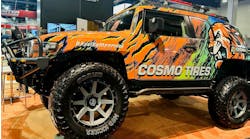Tire pricing improved slightly in September, says industry analyst and Modern Tire Dealer columnist Nick Mitchell. But there are also early signs of some price drops coming into play for the final quarter of 2017.
“We have heard of a few downward price adjustments at the start of the fourth quarter of 2017 in the bottom half of the Tier 2 and Tier 3 segments of the market, including brands in these buckets controlled or owned by Tier 1 players. As a result, we are keeping a close eye on pricing trends as we near key high-volume sellout months.”
In September, the average tire price increased 0.1% to $128.78. Premium tire prices increased 0.5%. (In the Northcoast Research Tire Pricing Index, the premium brands include Michelin, BF Goodrich, Pirelli, Goodyear and Bridgestone.) Value tires (Hankook, Dunlop and various imported and private label brands) increased 0.3%.
The price of mid-tier tires dropped 1% in September, from $121.51 to $120.27. (Mid-tier tire brands include Continental, Cooper and Yokohama.)
The longer term trend is better. As of September, the year-over-year average tire price in every category measured is up.
| Tire price | Year-over-year price change | Year-over-year percent change |
| Average tire | $3.72 | 3% |
| Average Top 10 Passenger | $3.40 | 2.8% |
| Average Top 10 Light truck | $5.90 | 3.8% |
| Premium tires | $2.58 | 1.9% |
| Mid-tier tires | $4.29 | 3.7% |
| Value tires | $5.06 | 4.5% |
Mitchell says his previously-noted volatility in SKU count by manufacturer continues. “We believe this phenomenon largely reflects the fact that dealers and wholesalers are being very tactical with their approach to inventory allocation given the promotional environment, timing of various pricing actions, elevated channel inventory, and volatile raw material prices.
“In short, the downstream players are directing orders in the most advantageous way to capitalize on the relative pricing spreads in the market. In our opinion, this dynamic should only impact near-term sell-in, and, to a lesser extent, sell-out market share rather than alter market share trends on a longer term basis.”
The brands Mitchell says are most affected: Cooper, Goodyear and Yokohama.


